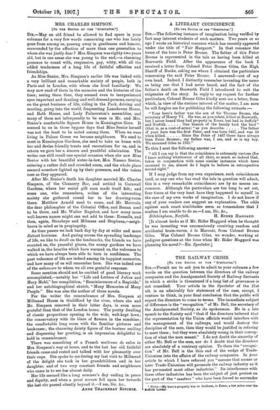MRS. CHARLES SIMPSON.
LTO TRH EDITOR OR TUE • SPRCfrATOR.1
SIR,—May an old friend be allowed to find space in your columns for a very few words concerning one who has lately gone from among us, passing away in gentleness and honour, surrounded by the affection of more than one generation to whom she was justly dear ? Mrs. Simpson was eighty-two years old, but in one sense she was young to the end,—a charming presence to count with, responsive, gay, witty, with all the 'added tenderness of a long life- of faithful affinities and friendships. •
As Miss Senior, Mrs. Simpson's earlier life was linked with a very brilliant and remarkable society of people, both in Paris and in London, with whom she lived familiarly. We may now read of them in the memoirs and the histories of the time; seeing them then, they seemed even to inexperienced eyes important and dazzling and well-dressed persons, carrying, on the great business of life, riding in the Park, driving and meeting, going•into the world, frequenting Lansdowne House, and Bath House, and Lady Palmerston's assemblies, and many of them not infrequently to be seen in Mr. and Mrs. Senior's comfortable Square House in Kensington Gore. It seemed to us in those bygone days that Miss Senior herself was not the least to be noted among them. When we were living in Palace Green we became neighbours. We used to meet in Kensington Gardens, she used to take us home with her and devise friendly treats and recreations for us, and in return we' gaveher a sincere and youthful admiration. The writer can still recall one special occasion when she saw Miss Senior with her beautiful sister-in-law, Mrs. Nassau Senior, entering a rather dull and crowded room, and the whole place seemed somehow lighted up by their presence, and the voices rose as they appeared.
After Mr. Senior's death his daughter married Mr. Charles Simpson, of the Chancery Bar, and settled in Cornwall Gardens, where her social gift soon made itself felt; and some one, who remembers, writes of the interesting ,society she gathered round her in her drawing-room there. Matthew Arnold used to come, and Mr. Merivale, the dear philosopher of the Colonial Office, and Renan used to be there, and Mr. Walter Bagehot, and how many more well-known names might one not add to these: Russells, and then, again, Stracheys and Milmans and 'Stephens,=neigh- boure in mind as in propinquity.
As time passes we look back day by day at wider and more distant horizons. And gazing across the spreading landscape of life, we like to dwell on the landmarks, the friends we have counted on, the peaceful places, the sunny gardens we have • walked in, the hearths which have warmed us, the welcomes to which we have always been able to turn in confidence. The • past welcomes of life are indeed among its happiest memories, and bow many of us will remember hers. -She was indeed one of the welcomers to whom we all owe grateful response.
Some mention should not be omitted of good literary work accomplished,—notably her "Life and Letters of Julius and Mary Mohl," her compilation, "Reminiscences of a Regicide," and her autobiographical sketch, "Many Memories of Many People?' She was also the author of three novels.
For the writer the remembrance of Mrs. Simpson at Millmead House in Guildford by the river, where she and Mr. Simpson removed in their latter days, is even more grateful than that of the London home. The pretty dwelling of classic proportions opening to the wide, well-kept lawn; the conservatory with its blaze of flowers in the sunshine ; the comfortable long room with the familiar pictures and bookcases ; the charming dainty figure of the hostess smiling • and dispensing her greeting, is an impression delightful to hold in remembrance.
There was something of a French maitresse de salon in Mrs. Simpson's way at home, and to the last her old faithful friends came and rested and talked with her pleasantly over their cups. She spoke to me during my last visit to Millmead of the delight she took in her grandchildren and in her daughter, and-of two very constant friends and neighbours who came in to see her almost daily. • Her life seemed like a long summer's day ending in peace and dignity, and when a great sorrow fell upon her towards the last she passed silently beyond it.—I am, Sir, Sze., ANNE THARKERA.T RITCHIE.










































 Previous page
Previous page